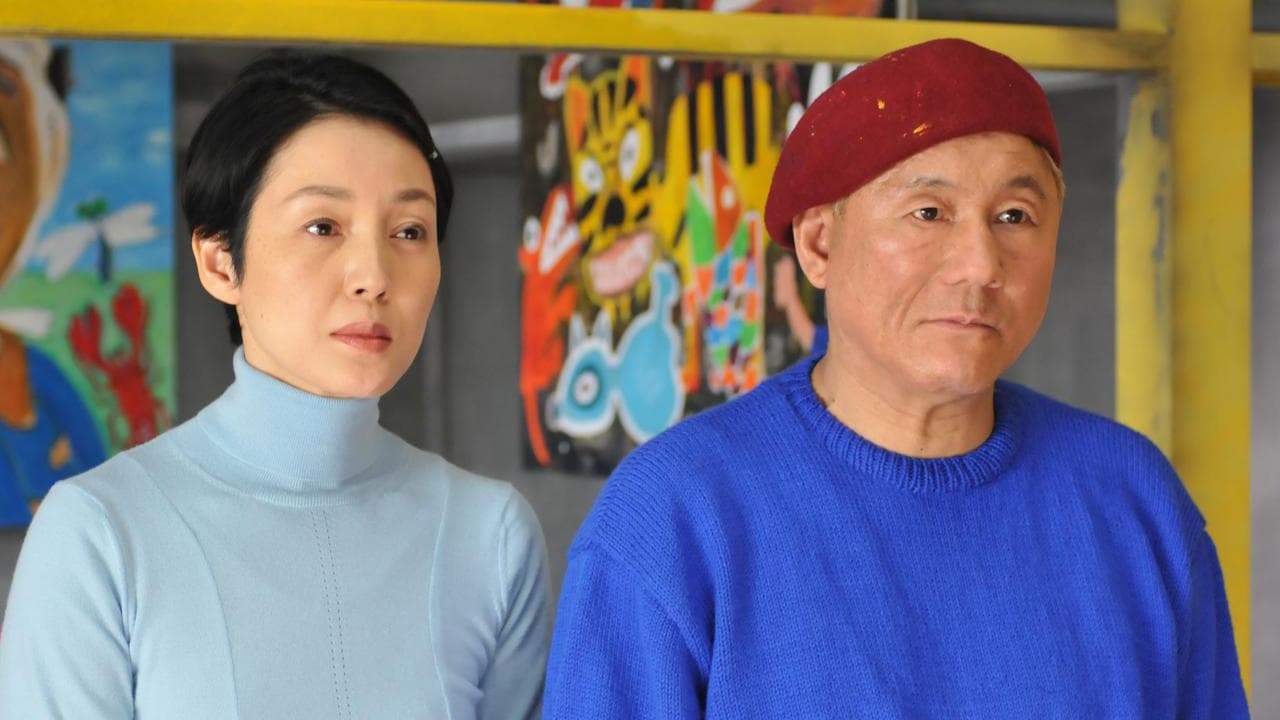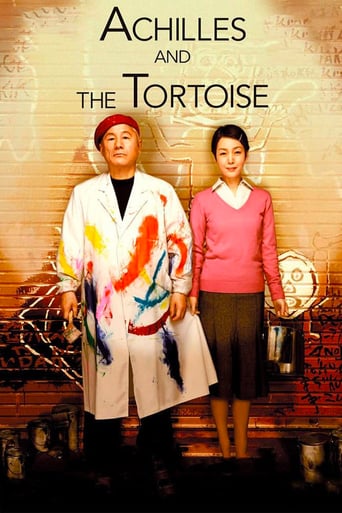

Too many fans seem to be blown away
... View MoreAmateur movie with Big budget
... View MoreIt's not great by any means, but it's a pretty good movie that didn't leave me filled with regret for investing time in it.
... View MoreThis is a dark and sometimes deeply uncomfortable drama
... View MoreThe movie does not work in only one level; so it can be seen as a sampling of art, in this case: "painting"; from different viewpoints or dimensions. Good actors, humor Kitano style, the Japanese twisted style; however it is a mixture of 2 or 3 movies in one; changes radically from one part to another (the movie is not formally divided) and the only connection seems the art itself (that s not bad at all...) The first half has a coherent development of the script, good photography and shows us the protagonist as a school kid then as a young man. He, an almost autistic person that seems unaffected by the (good and bad) things that happen in his life. Perhaps the answer to why he continues to fail in his work. Failure to get emotionally involved in a way o another in such episodes or not take part physically or to be mentally affected by them, makes an artist that will not acquire the necessary skills (after assimilate and process its) to then translate them into his work; normally a way to say things or feelings of what a person (an artist) can not say in another way. We see a person who may have a natural talent for painting, or based on to paint and repetition developed good capabilities but do not know how to let out his own creative streak, which just ends up imitating the great painters or following great schools of painting in an evident level.-in a second part of the movie, changes completely and we see Kitano, fulfilling the lead role and with his rough style and Yakuza pose, this main character loses all silence and dedicating autism demanding constantly to his suffered side kick wife; dragging them in a not so good life. In this part the artist is showed like an "art junkie" There s kind of humor here and the shots are more TV like ones. The movie could be better or could be at least two movies...
... View MoreItano Takeshi's movie reminds us two facts that unfold from the same root: timocracy. Timocracy, from Plato, is the rule of the worthy. I take this as distinct from plutocracy, which is the rule of the wealthy. In societies where self worth is overlapped with economic value, than all plutocracy is also timocracy. Since Van Gogh (Heinich), it is clear that worth in arts stems from self-sacrifice for a superior cause: art itself. But this is not just "art-for-art-sake" (Bourdieu) as if an individual resigned to poverty is able to finally pursue his true inner calling. Machisu Kuramochi (Takeshi) is always checking his last oeuvres with a merchant, the true source of recognition. Impossible to achieve such recognition, the quest resembles Achiles's towards the turtle: although it is a farce (the intrinsic worth in art) it is (because of it) impossible to achieve. Self-destruction is tried (again we must think of Van Gogh), but here Achiles achieves the turtle. It is granted to the artist some human condition. The most touching scene is Kuromochi taking the "sudary" from his daughter's face. Art as sacred and sacrilege is all articulated in few minutes on screen.
... View MoreBeat Takeshi's "Dolls" is one of my favorite movies, and I really enjoyed his other films "Kikujirou no Natsu", "Zatoichi", and "Brother". However, his last two films I viewed, "Kantoku, Banzai!!" and "Takeshis'" were nothing but narcissistic garbage, so I expected nothing from this movie. To my surprise, it turned out to be a fantastic film that's not only funny, but also deep.The story follows the life of a boy who loves art and destined to become an artist, though fail to achieve success due to lack of originality and excessive imitation.What I really liked about this film is that it explores what art really is, and pokes fun at the absurdity of some of today's so-called 'modern art'. It also depicts the suffering of an artist whose works are not 'understood' by others. It's interesting Kitano Takeshi's films are often artistic in its own way. Makes me wonder if his previous two films were too artistic for me to comprehend? In any case, I enjoyed this film tremendously, and there were many memorable moments. Casting was done extremely well, especially in the 'college days', and all the actors gave a great performance for this wonderful movie.
... View MoreAchilles and the Tortoise is the last installment in a loose trilogy actor/director Takeshi Kitano has made about the figure of the artist. Whereas the first two entries, Takeshi's and Glory to the Filmmaker, could basically be described as one big self-referential absurdist joke, Achilles is a more controlled film, with a proper story and a precise set of themes, albeit decorated with cheerfully absurd humor.Such a scenario occurs right from the beginning, in an animated prologue which explains the bizarre title: as pointed out by the philosopher Zeno, if Achilles (the fastest mortal man, according to Greek mythology) and a tortoise competed in a race, and the latter had even the slightest advantage (say three feet), logic demands that in the time required for Achilles to reach that point, the tortoise would keep moving forward, and therefore the famous warrior, paradoxically enough, would never be able to catch up with the notoriously slow animal.In Kitano's film, Achilles would be Machisu, a young boy fascinated by art, and the tortoise is success. Despite the boy's determination and occasionally bold choices of subjects (he has a knack for painting macabre events), his lack of stylistic originality makes all galleries shun him and most of his friends abandon him. Only his wife will keep supporting him, even in his older days (at this point, Kitano himself plays the role), when they're practically broke and their own daughter is ashamed to live in the same house as them.Kitano's passion for painting is quite well known among those familiar with his work (he personally makes all the artwork that shows up in his movies), and so Achilles and the Tortoise is a good opportunity for him to use his hobby as a tool to reflect on the elusive subject of art and its various ramifications. Naturally, he does this with his usual penchant for darkly humorous set-ups, especially in the third act, with some scenes so audacious it's doubtful even something like Six Feet Under would have featured them. And yet one does not feel repulsed by those scenes. On the contrary, it's the absurdity of the plot, paired with Kitano's quietly composed directing and minimalistic performance, that constitutes the movie's primary point of attraction. In fact, Kitano's on-screen presence is so charismatic that perhaps he would have been better off shortening the first section of the picture and granting his quirky alter ego more room. Furthermore, the straightforward "happy" ending feels completely at odds with everything else, but then again coming up with a suitably crazy epilogue might have proved too arduous a task.Ultimately, the only thing that seriously damages a part of this strange and, in its own way, funny opus is the running time (almost two hours), with minor help from the somewhat off- beat conclusion. Nevertheless, Kitano fans are likely to find something to embrace yet again, and anyone with some kind of interest in art should take a good, close look at this original take on the matter.
... View More